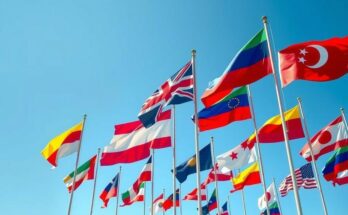Wisconsin’s Supreme Court election, now underway, has attracted massive funding, totaling $59 million, largely from donors like Elon Musk. This race highlights the ideological divisions in national politics as candidates Brad Schimel and Susan Crawford vie for control of the court, impacting key issues such as abortion rights and voting laws. Voter engagement reflects concerns about external influences, with significant involvement from both conservative and liberal megadonors driving the contest’s intensity.
Wisconsin is currently witnessing a pivotal state Supreme Court election, where early voting has commenced amid record-breaking campaign expenditures totaling $59 million. This election has emerged as a critical reflection of broader national political dynamics, significantly influenced by high-profile contributors, including billionaire Elon Musk. The contest involves Republican candidate Brad Schimel and Democrat Susan Crawford, both of whom represent diverging values that could determine the ideological direction of the court regarding pressing issues such as abortion and voting rights.
Voter engagement in Wisconsin reveals a heightened awareness of the election’s national implications. Residents have expressed concerns over the substantial influence of outside funding on judicial races, with voters like Maggie Freespirit advocating for Crawford due to her commitment to preserving abortion rights. Conversely, Steve Ravely, a supporter of Schimel, emphasized his alignment with conservative views on immigration and constitutional adherence, while also criticizing the involvement of liberal donors such as George Soros.
Financial contributions to the election have reached unprecedented levels, exceeding previous records. Over $11 million has been attributed to Musk-affiliated organizations supporting Schimel. Conservative figures, including Donald Trump Jr. and activist Charlie Kirk, have been actively rallying support, indicating the election’s significance for Trump loyalists. Meanwhile, Democratic financing by notable figures including Soros and Illinois Governor J.B. Pritzker seeks to bolster Crawford’s campaign, suggesting a fierce battle is imminent.
Efforts to mobilize voters against Musk’s influence have also gained traction, as Democratic leaders stress the importance of local engagement. Figures like Minnesota Governor Tim Walz have articulated a strategy for effective grassroots activism to counteract external pressures, with communities such as Black Leaders Organizing Communities emphasizing sustained engagement regardless of electoral cycles.
Musk’s financial involvement is viewed skeptically by some constituents, who fear it may unfairly sway election outcomes. Concerns have been voiced in places like Milwaukee, where some voters are apprehensive about the implications of a single billionaire’s power in local elections. The political affiliations between Schimel and Trump accentuate this tension, as Schimel has actively sought Trump’s endorsement, positioning himself as a candidate influenced by Trump’s agenda.
The conclusion of the election cycle has intensified campaigns aimed at maximizing voter turnout on both sides. Momentum is building as Musk-supported entities disseminate information urging voters to back Schimel, while Crawford’s campaign frames the contest as a challenge to the growing influence of right-wing billionaires. Thus, this election has evolved into a crucial battleground for determining the direction not only of Wisconsin’s judiciary but also the broader context of American democratic practices.
The Wisconsin Supreme Court election stands as a significant event influenced by substantial external funding and national political stakes, highlighting the growing intersection between state-level judicial races and broader national issues. The active engagement of voters reflects their concerns regarding the integrity of election processes against the backdrop of billionaire influence. As the election approaches, both parties are laying the groundwork for mobilizing their respective voter bases, underscoring its potential ramifications for the future of the judiciary and democratic governance in the United States.
Original Source: www.newsweek.com




